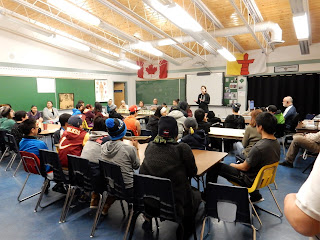My students were indeed shocked when
I showed them the photograph I took in an Ottawa grocery store during the
Christmas Holidays. Two-litre Coke
bottles were being sold at 4 bottles for $5.
Such a deal does not exist in Arctic Bay. A two-litre bottle of any kind of soft drink
would cost between $15 - $25 if you factor in shipping costs by ship and air. My students wished the pop prices were the
same as down south, although, many also agreed that such prices could lead to
an increase in diabetes.
The routines of my classes were
well-established by the end of the second week of the semester. The days also began to go by at a faster
pace. I guess that usually happens when
your body & mind become accustomed to routines.
My
Grade 10 English students focused their studies on literary elements and how
they’re applied in short stories. We
read a variety of short stories written by Canadian, America, British, and New
Zealand authors. For Grades 10 & 11
Social Studies, my students examined globalization and how it affects Canada
and the world. What I like about the
textbooks is that they contain case studies of people responding to the
challenges of globalization. I also
included examples from Nunavut. The
students were surprised to learn that globalization reaches every corner of the
globe, even isolated communities like Arctic Bay. For the month of January, my guitarists
focused their attention on learning how to read traditional notation, playing
simple songs, counting, and playing as a group.
The cadets of 3045 Army Cadet Corps
were ecstatic on January 14, because they received new blue toques that were
adorned with the RCAC & NEAS logos.
NEAS, the sealift company & the corps latest sponsor, supplied the
toques. We took several photographs and
emailed them to NEAS as a way of saying thank you.
January 14 was also a special day
for Qaapik Attagutsiak, a prominent elder in Arctic Bay. CBC News North wrote an article about her
passion for traditional clothing, being a seamstress for 86 years (and
counting), and teaching youth “the value of traditional Inuit clothing and
sewing skills”. I met and spoke with
Qaapik two years ago when I went ice chiseling with one of her daughters.
My older brother made his first
visit to Arctic Bay during the second week of January. The Nunavut Court of Justice (NCJ) was in the
community to hear & preside over various cases involving community
members. The court party included:
judge, two crown prosecutors, one crown witness coordinator, three defence
lawyers, and one sheriff. My brother is Nunavut’s
latest crown prosecutor based in Iqaluit.
I had fair warning that my brother would be visiting my “neck of the
Arctic” and made the necessary arrangements prior to his arrival. He would be staying at my place for the
duration of his visit while saving the NCJ several hundreds of dollars on hotel
accommodation.
Nunavut’s court system functions
differently than the rest of Canada. For
starters, Iqaluit has the only dedicated court house in the territory. When the judges & legal teams travel to
the communities, the courts are held in buildings that provide the most
space. This can mean community centres,
schools, or whatever is available. Hotel
accommodation is also a challenge because the hotels are small, and
reservations only guarantee a bed, not the entire room. Local elders sit in on court proceedings and
their input is considered by the judge before a verdict is given.
I still had to teach while my
brother was in court. He had a suitcase
full of documents that needed to be reviewed before the proceedings. Arctic Bay’s community hall was turned into a
makeshift courthouse for the next several days.
It didn’t take long for the community to discover that my brother was in
town. My students periodically came into
my classroom to tell me that they had met my brother. They commented that he was following in my
footsteps. I replied that they were
correct to some extent. We both came to
the north seeking employment and adventure, but in different professions.
When
my brother came to the school during lunchtime one day, I introduced him to the
staff, and showed him my classroom.
Later that evening, I gave him a lift home on my skidoo. He was nervous when I drove out onto the
frozen bay but I reassured him that the ice was thick enough for a large
airplane. My brother flew back to
Iqaluit on January 17. He thanked me for
my hospitality and said he would return in June for another round of court
proceedings. The judge and the rest of
the staff continued on to Resolute Bay & Grise Fiord.
 |
| Amy S., from the Law Society of Nunavut, speaks to the students. |
 |
| Local elder Kigutikarjuk, S. speaks to the students. |
Three representatives from the Law Society of Nunavut spoke to the high school students on January 18. They wanted to explain the role of the
courts, how they work, and why do they exist.
Four elders were also in attendance because they sit in on the court
proceedings and assist the travelling judge(s).
The elders spoke about the emotions that can surface when in court (as a
suspect, or witness), how the stress can lead to suicidal thoughts, and how to
overcome such stresses with resilience.
Snacks were provided to everyone in attendance.
And finally, I’ve noticed that my collection of Inuit carvings is
steadily getting bigger as the months go by.
I’m starting to run out of space to put them. The centerpiece for my coffee table used to
be a qulliq (traditional oil lamp). Now
it’s three carvings of a polar bear, inukshuk, and a standing narwhal. The three carvings are made by the same local
carver. I still have the qulliq; it’s
just been moved to another suitable location.







